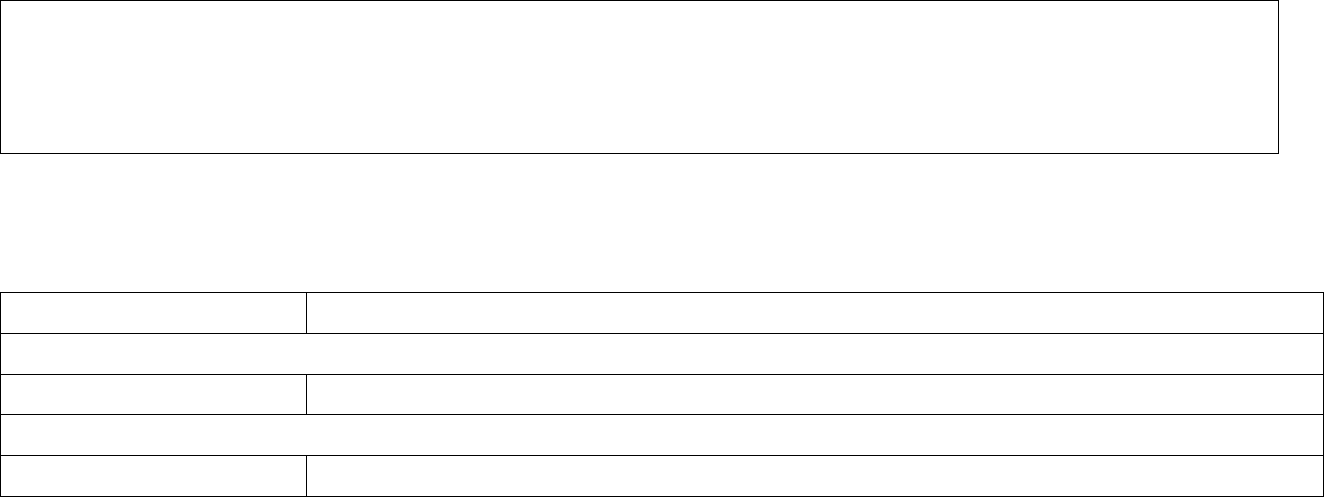
Independent Practice by Subspecialty Updated 07/2022
©2023 Accreditation Council for Graduate Medical Education (ACGME) Page 1 of 5
Subspecialty-Specific Program Requirements: Independent Practice
Effective as of July 1, 2022
Common Program Requirements are in bold
The Common Program Requirements (Fellowship and One-Year Fellowship) allow Review Committees the option of permitting
independent practice as referenced in Common Program Requirements IV.E.-IV.E.1.
IV.E. Fellowship programs may assign fellows to engage in the independent practice of their core specialty during
their fellowship program.
IV.E.1. If programs permit their fellows to utilize the independent practice option, it must not exceed 20
percent of their time per week or 10 weeks of an academic year.
(Core)
[This section will be deleted for those Review Committees that choose not to permit the independent practice option. For
those that choose to permit this option, the Review Committee may further specify.]
Background and Intent: Fellows who have previously completed residency programs have demonstrated sufficient
competence to enter autonomous practice within their core specialty. This option is designed to enhance fellows’
maturation and competence in their core specialty. This enables fellows to occupy a dual role in the health system: as
learners in their subspecialty, and as credentialed practitioners in their core specialty. Hours worked in independent
practice during fellowship still fall under the clinical and educational work hour limits. See Program Director Guide for
more details.
Additionally, as stated in the Common Program Requirements, Review Committees may further define expectations related to
independent practice. The table below lists the subspecialties that permit independent practice as of July 1, 2022 and, where
applicable, additional specialty-specific program requirements and background and intent.
Subspecialty Name
Additional Subspecialty-Specific Requirements Referencing “Independent Practice”
Review Committee for Dermatology
Pediatric Dermatology
-
Review Committee for Emergency Medicine
Emergency Medical Services
IV.E.2. Fellows should maintain their primary Board skills during their fellowships.
(Core)

Independent Practice by Subspecialty Updated 07/2022
©2023 Accreditation Council for Graduate Medical Education (ACGME) Page 2 of 5
Subspecialty Name
Additional Subspecialty-Specific Requirements Referencing “Independent Practice”
Specialty-Specific Background and Intent: The Review Committee for Emergency Medicine
considers the requirements above to be exclusive of moonlighting. Additional time spent by the
fellows in the engagement of independent practice of their core specialty beyond the maximum
stated in the Requirements will be considered moonlighting, and will be counted toward the 80-hour
maximum clinical time per week.
Review Committee for Obstetrics and Gynecology
Complex Family Planning
IV.E.1.a) No more than four hours per week of independent practice, averaged over a four-week
period, may occur on weekdays during regular office hours.
(Core)
Gynecologic Oncology
IV.E.1.a) Independent practice must be limited to four hours per week, averaged over a four-week
period.
(Core)
Maternal-Fetal Medicine
IV.E.1.a) No more than four hours per week of independent practice, averaged over a four-week period,
may occur on a weekday during regular office hours.
(Core)
Reproductive Endocrinology
and Infertility
IV.E.1.a) No more than four hours per week of independent practice, averaged over a four-week period,
may occur on a weekday during regular office hours.
(Core)
Review Committee for Orthopaedic Surgery
Adult Reconstructive
Orthopaedic Surgery
-
Foot and Ankle Orthopaedic
Surgery
-
Musculoskeletal Oncology
-
Orthopaedic Sports Medicine
-
Orthopaedic Trauma
-
Pediatric Orthopaedic Surgery
-

Independent Practice by Subspecialty Updated 07/2022
©2023 Accreditation Council for Graduate Medical Education (ACGME) Page 3 of 5
Subspecialty Name
Additional Subspecialty-Specific Requirements Referencing “Independent Practice”
Surgery of the Spine
-
Review Committee for Otolaryngology – Head and Neck Surgery
Neurotology
-
Pediatric Otolaryngology
-
Review Committee for Plastic Surgery
Craniofacial Plastic Surgery
-
Review Committee for Urology
Pediatric Urology
IV.E.1.a) While pediatric urology programs are permitted to utilize independent practice in general
urology, this must not exceed 10 percent of fellows’ time per week, averaged over four weeks, up to a
maximum of 24 hours per month.
(Core)
Specialty-Specific Background and Intent: Fellows must limit independent practice to general
urology. General urologic surgical care of pediatric patients includes circumcision/revisions,
cystoscopy/ureteroscopy in adolescents, meatoplasty, simple orchidopexy, and testicular torsion
treatment.
Multidisciplinary Subspecialties
Clinical Informatics
(subspecialty of
Anesthesiology, Radiology,
Emergency Medicine, Family
Medicine, Internal Medicine,
Medical Genetics, Pathology,
Pediatrics, or Preventive
Medicine)
-
Female Pelvic Medicine and
Reconstructive Surgery
(subspecialty of Obstetrics
and Gynecology or Urology)
IV.E.1.a) Female pelvic medicine and reproductive surgery programs are permitted to assign fellows to
independent practice in their primary specialty, but such practice must not exceed 10 percent of a
fellow’s time per week, averaged over four weeks.
(Core)

Independent Practice by Subspecialty Updated 07/2022
©2023 Accreditation Council for Graduate Medical Education (ACGME) Page 4 of 5
Subspecialty Name
Additional Subspecialty-Specific Requirements Referencing “Independent Practice”
IV.E.1.a).(1) Independent practice during regular office hours must be limited to four hours per week,
averaged over four weeks.
(Core)
IV.E.1.a).(2) The total amount of independent practice, both during and outside of regular office hours,
must not exceed 24 hours a month.
(Core)
Specialty-Specific Background and Intent: Female pelvic medicine and reconstructive surgery must
be the primary focus of a fellow’s clinical practice. Independent practice must not substantially
interfere with fellows’ subspecialty education. Fellows who enter the female pelvic medicine and
reconstructive surgery program after completing an obstetrics and gynecology program must limit
independent practice to general obstetrics and gynecology. Fellows who enter the female pelvic
medicine and reconstructive surgery program after completing a urology program must limit
independent practice to general urology.
Regular office hours are defined as Monday through Friday, 8:00 a.m. to 5:00 p.m.
Hand Surgery
(subspecialty of Orthopaedic
Surgery, Plastic Surgery, or
Surgery)
-
Medical Toxicology
(subspecialty of Emergency
Medicine or Preventive
Medicine)
IV.E.2. Fellows should maintain their primary specialty Board skills during the fellowship.
(Core)
Specialty-Specific Background and Intent: The Review Committee for Emergency Medicine
considers the requirements above to be exclusive of moonlighting. Additional time spent by the
fellows in the engagement of independent practice of their core specialty beyond the maximum
stated in the requirements will be considered moonlighting, and will be counted toward the 80-hour
maximum clinical time per week.
Neurocritical Care
(Subspecialty of Neurology
and Neurological Surgery
-
Sports Medicine
(subspecialty of Emergency
-

Independent Practice by Subspecialty Updated 07/2022
©2023 Accreditation Council for Graduate Medical Education (ACGME) Page 5 of 5
Subspecialty Name
Additional Subspecialty-Specific Requirements Referencing “Independent Practice”
Medicine, Family Medicine,
Pediatrics, or Physical
Medicine and Rehabilitation)
Undersea and Hyperbaric
Medicine
(subspecialty of Emergency
Medicine or Preventive
Medicine)
IV.E.2. Fellows should maintain their primary Board skills during their fellowship.
(Core)
Specialty-Specific Background and Intent: The Review Committee for Emergency Medicine
considers the requirements above to be exclusive of moonlighting. Additional time spent by the
fellows in the engagement of independent practice of their core specialty beyond the maximum
stated in the requirements will be considered moonlighting, and will be counted toward the 80-hour
maximum clinical time per week.
Sponsoring Institution-Based Fellowships
Health Care Administration,
Leadership, and Management
IV.E.1.a) If Sponsoring Institution-based fellowship programs permit their fellows to utilize the
independent practice option, it must not exceed 50 percent of their time for fellows completing the
fellowship in the 24-month format.
(Core)
IV.E.1.b) Fellows completing the fellowship in the 12-month format may not exceed 25 percent of their
time utilizing the independent practice option.
(Core)
Sponsoring Institution-Based Fellowship-Specific Background and Intent: Fellows in health care
administration, leadership, and management programs should have opportunities to pursue ongoing
clinical practice in their individual specialty and/or subspecialty area while completing the program.
While responsibilities for direct patient care are outside the scope of the fellowship, fellows’ optional
engagement in medical practice may facilitate their continued professional development as physician
leaders. The Sponsoring Institution and program should provide oversight of ongoing clinical practice
to ensure that fellows have adequate time to complete their fellowship responsibilities.
